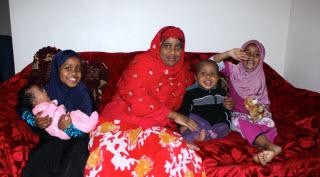- Home
- News
- Screening Matters, Issue 42, October 2013
- Newborn hearing screening ‘best thing for your child’
News
- Screening Matters Newsletter
- April 2019
- April 2018
- December 2017
- August 2017
- April 2017
- December 2016
- October 2016
- March 2016
- November 2015
- August 2015
- June 2015
- April 2015
- February 2015
- December 2014
- October 2014
- August 2014
- June 2014
- April 2014
- February 2014
- December 2013
- October 2013
- August 2013
- June 2013
- April 2013
- February 2013
Screening Matters
The National Screening Unit newsletter
In this issue:
- Newborn hearing screening ‘best thing for your child’
- Many advantages for private provider in electronic colposcopy reporting
- Regional Screening Services Wellington spreads the word to new immigrants
- NSU and DHBs progressing recommendations from newborn hearing screening programme quality improvement review
- Reminder about timing of bloods for antenatal screening for Down syndrome and other conditions
- Loud shirts all for a good cause
- Electronic colposcopy and the new colposcopy standards update
- Introducing Joyce Brown
- NCSP Register Central Team update
- Updated NCSP policy and standards: providing a laboratory service
- Otago and Southland breast screening services to be provided locally
Newborn hearing screening ‘best thing for your child’

Hodan moved to New Zealand from Kenya nine years ago and had her first child, Fatuma, before the Universal Newborn Hearing Screening and Early Intervention Programme (UNHSEIP) was available.
Hodan expressed concern to her GP that Fatuma was not talking at 18 months, but was assured that all children develop at different stages. “I was a first time mum and didn’t know any different, so just accepted it was all okay,” she says.
It was only when another doctor examined Fatuma and was unable to get her attention by talking to her that it became clear something was wrong. Fatuma was diagnosed with congenital bilateral sensorineural hearing loss, and in 2009 had a cochlear implant. Unfortunately, the implant failed because of nerve damage and another implant was successfully carried out in 2011.
Fatuma is now seven and all communication is through sign language.
“If the newborn hearing checks were available when Fatuma was born, she could have had the cochlear implant and would now be able to talk like everyone else,” says Hodan.
Hodan and her husband have since had three other children, all of whom had the newborn hearing screening checks and who are regularly re-checked. “Because of Fatuma, I have been nervous for the others. The checks have reassured me,” says Hodan. Her two-year old son Salman has recently had grommets fitted, as tests picked up he had glue ear.
The UNHSEIP is a joint initiative. The Ministry of Health has responsibility for screening, diagnosis of hearing loss, and medical interventions, including devices such as hearing aids and cochlear implants. The Ministry of Education has responsibility for early intervention education services.
The core goals of the programme, which are based on international best practice, are described as ‘1-3-6’ goals:
1 = babies to be screened by one month of age
3 = audiology assessment completed by three months of age
6 = initiation of appropriate medical, audiological and early intervention education services by six months of age.
“The newborn hearing checks are absolutely the best thing to do for your child,” says Hodan, who urges all mothers to ensure their babies are screened. “The testing is often done when your baby is asleep and doesn’t hurt them. My babies slept through them.”
Hodan’s youngest daughter Zaynab is just five weeks old, and much to Hodan’s relief, passed the newborn hearing screening performed by the Capital & Coast DHB UNHSEIP.
To receive the Screening Matters newsletter by email, fill out our sign-up form.

